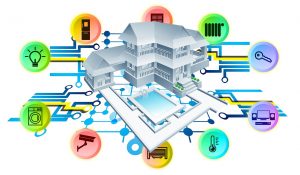When you think of the internet, it’s likely your mind goes in one of two directions.
First, data and information. The internet is full of data, and that data has made finding and accumulating information easier than at any time in the history of the world. Sounds like a pretty bodacious claim. But it’s true. If you want information, you can find it—good and bad, right and wrong.
Second, connection. My laptop can be connected to your laptop. Your laptop can be connected to your company’s server. Your company’s server can be connected to each of your customers’ servers. It’s a seemingly endless connection of computers here and throughout the world.
Both are true. But there is another internet that may ultimately have more impact on our lives, personal and business, than the other two.
It’s the internet of things.
What is this internet of things exactly? Here are a couple of examples.
If you have a music sharing service on your smartphone, your phone is a part of the internet of things. It’s not only allowing you to stream music wherever you are, but it’s capturing data about your location, listening habits, and even clicks you make from your phone from within the program.
 Or, if you have a webcam in your home security system you can observe from the laptop you carry for work, your system is part of the internet of things. Data is transferred, collected, stored and returned to you in sales offers and other customized communications.
Or, if you have a webcam in your home security system you can observe from the laptop you carry for work, your system is part of the internet of things. Data is transferred, collected, stored and returned to you in sales offers and other customized communications.
Homes, businesses and companies can all be connected to smartphones, tablets and laptops anywhere and everywhere.
So what does that mean to you? The short answer is, quite a lot.
Take your smartphone for example. As late as ten years ago (and certainly fifteen years back), you carried a mobile phone. And it was just that—a device from which you could make a call, person-to-person, from wherever you happened to be. The thought that a decade later it would eventually be a device on which making an actual call was a far less primary capability would have been laughed at. But making a call is not the main activity of a smartphone at all.
And the thermostat in your home. It was a basic item, unchanged for decades, until the emergence of smart technology. Then, we became empowered to adjust our thermostats from wherever we were, another country, or another room.
Fitbits and Jawbones track our exercise, then send data to a central point to be calculated and returned to us as information.
Refrigerators can be programmed to give us our grocery lists, and even place our order to be picked up.
Locks can be opened automatically by chips programmed in our devices.
NetCare™ can help.
As a Carolinas NetCare client, it’s important to remember: before you add things to any of your systems or processes, talk with us first. Some of these things are actually good, and chances are for the good ones, we already have experience in their safe implementation. Others, while not inherently bad, may open you up to compromises you may not want. Just ask. It’s why we’re here. It’s why you hired us in the first place, and it’s part of the service we already offer you.
In short, the internet of things represents a shift in how businesses of all types need to think. It should be taken into account with every aspect of your business, internal and external, employee and customer. There are a few flip phone users still around, but almost no one would choose to go back to a phone that’s just a phone. Before you know it, we’ll feel the same about smart kitchens, smart homes, smart cars, smart roads, smart buildings and who knows what smart else.
The internet of things could change everything you and your business will be doing in the future. Strap in, it’s gonna be a wild ride!
ShareNOV
2017


